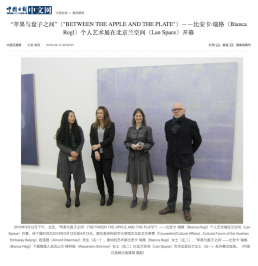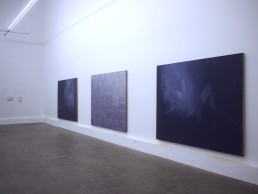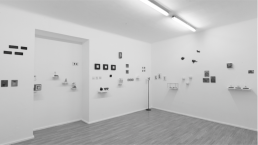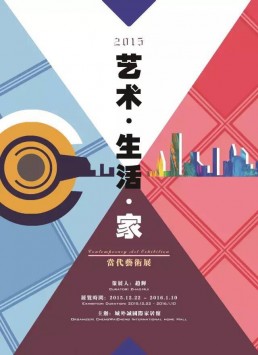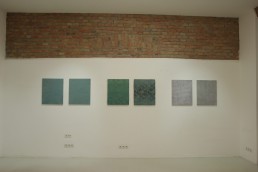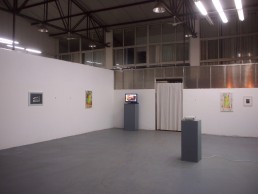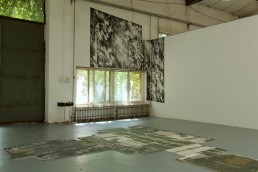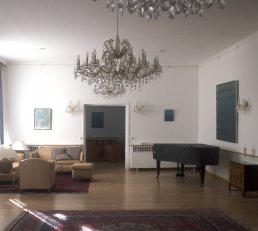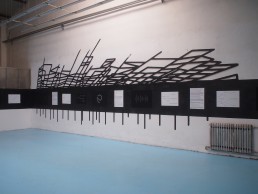THE DISTANT SHORE / Niuchang Museum, Beijing, China
Bianca Regl : The Distant Shore
Niuchang Art Museum, Beijing, China / 3.13.2016 - 4.22.2016
Between the apple and the plate CHINA DAILY
China Daily Review on "Between the apple and the plate", March 16, 2016
Between the apple and the plate / LAN SPACE
Bianca Regl : Between the apple and the plate
LAN SPACE Beijing / 2016-03-12 to 2016-04-20
Kone, Regl, Schmalix
Moussa Kone / Bianca Regl / Hubert Schmalix
Herminengasse1, Vienna 2015.10.15-2015.11.18
Improper Nouns / Curated by James Krone / Blackbridge Offspace
In a letter to his friend Georges Izambard from 1871, the sixteen year old Arthur Rimbaud wrote, “Tant pis pour le bois que se trouve violon.” The literal translation of the phrase from French into English is, “Too bad for the piece of wood that finds itself a violin.” I’ve only just discovered this after sending the sentence through an online translation program. Following up, I see this translation repeated throughout various online course materials for a handful of liberal arts universities that I’ve never heard of.
When I first encountered the quote years ago it was in English and had been translated as, “So what if a violin discovers it’s a violin?” I most recently saw this incar- nation as an opening epitaph in a Dennis Cooper novel. I would tend to side with Dennis Cooper’s interpretation of Rimbaud’s intentions rather than with a hokey profes- sor who blogs for his class on a tumblr page. But now the validity of this quote, the one I’ve regarded for years as native and true, the time I’ve spent considering it, is th- reatened by literary comprehension splash pages and the barf well of Bing translator.
I had wished to use the quote and the axis of its introduc- tory usage of s o what as a reflexive hinge from the specu- lative s o what (happens then) to the indifferent s o what (who cares). Whether it is a celebratory, horrific or indiffe- rent realization, what if something ceases to identify with that which had been it’s presumed and given order?
So what ( happens then) if a piece of wood discovers it’s a violin o pens a field of existential questions as to what is possible or comprehensible in relation to identity. What can one do if overcome by the influence of an external desi- re or an alien identity? Are we anything other than a black box theatre for the transmutations of unknown influences, coming from within and without? If so then how can inten- tion ever be claimed or the ego located within the frame- work of a singular expression? Is this discovery a freedom or a sentencing?
So what (who cares) if a piece of wood discovers it’s a violin e liminates all difference rather pessimistically. It makes no difference anyhow. The wood is screwed. Violins and the will to play them exist merely as an aberration of chance in a universe expanding towards its own destruction. But Too bad for the piece of wood that finds itself a violin complica- tes the matter by potentially offering the half hearted pity of a rubbernecker.
“OMG. Too bad!!!” :(
My confidence in what I thought would be a quick probe of a reflexive thought has diminished and been replaced by doubt and now spins out into a seemingly meaningless number of directions.
So what if a piece of wood doesn’t believe in transfigura- tion?
So what if a piece of wood discovers it’s the handle for a toilet brush?
So what if a toilet brush discovers it’s a piece of wood?
If there is a consistent thread to the logic of all translations of this short phrase, it is the suggestion that a fracture or an entire revolution in self recognition may just occur out of the blue, regardless as to whether this fracture might be of any significance. So it goes.
If one believes this to be a possibility, as I do, then they must look at themselves, at least partially, as a suspicious delegate.
Once a person agrees to recognize the veracity of this so- cial contract (a kind of open door policy between them- selves and the other) it becomes very difficult to ascribe a fixed location to the goings on of one’s ego as a singular impenetrable entity.
If Duchamp’s artist of the future was to merely point at things instead of producing them, I will suggest that this time has passed us. Things have been pointed at often and for extended durations with such intense projections of desire and analysis that they seem to have become im- bued with something like a pathos of their own to point back with. Perhaps this resemblance of aura is only an ef- fect that comes from the great emptying of human pathos on the behalf of things material. Perhaps more than ele- vating the object, our human sacrifices to them may have brought us down to the level of employment vessels. It is not outside the realm of possibility to consider them as mutant peers in the sense that these objects and ourselves have a horizontal correspondence and transfer back and forth between each other like rented organs.
Although I am entirely untrained musically and cannot read musical notation, on occasion my dreams are scored with what seem to be entirely composed, symphonical- ly performed pieces of incidental music that I’ve never heard elsewhere. They vaguely resemble the emotive hol- lowness of Hollywood melodramas from the 1980’s. They are mediocre, banal and emerge like heat through a vent. (James Krone)
Rims & Reasons / Curated by Julia Steiner / Blackbridge Offspace
the floor is grey, the walls are white with nails and cracks and whispering lines.
the dimmed daylight is falling through the rooftop window.
thoughts reflected on the floor. doors to other days and nights.
someones walk left a mark and a squeak behind.
a stick is leaning against the wall, tickling the surface.
on a screen, the universe is flickering forever. noise is chirring between the lines.
the stars spread under the carpet, talking with the dancing curtain. (Julia Steiner)
Acosmology / Curated by Christian Schwarzwald / Blackbridge Offspace
Cosmology is the study of the world. It deals with the questions of the origin and evolution of the universe. What we call Acosmology is an artistic and philosophical approach to the universe as being-totality by interrogating its a-cosmological (= chaotic & contingent) aspects. Its about the world as inconsistent (= open, fragile) universe. (Christian Schwarzwald & Marcus Steinweg)

